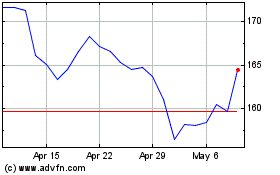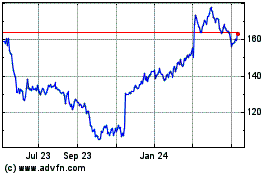Today's Top Supply Chain and Logistics News From WSJ
August 30 2016 - 7:01AM
Dow Jones News
By Paul Page
Sign up:With one click, get this newsletter delivered to your
inbox.
The U.S. ports that normally brace for a surge in imports
heading into the fall are seeing something different this year: a
change in supply chain strategies. Inbound business has been flat
at major seaports heading into the peak shipping season, the
stretch when retailers load up on goods for the upcoming holidays.
If the trend holds, WSJ Logistics Report's Erica E. Phillips and
Robbie Whelan write, it will be the second straight year without a
traditional peak. Economists say the subdued shipping suggest
retailers are slimming supply chains as customers move online.
Companies such as Target Corp., Lowe's Cos. and J.C. Penney Inc.
are pivoting away from maintaining stores brimming with
merchandise, instead housing fewer goods in warehouses where they
can quickly ship to stores or fulfill online orders. The shift has
come as ports have spent billions of dollars to improve their
ability to handle more goods coming on bigger ships. This year,
however, ocean lines have been scrapping vessels and cutting back
service, an effort aimed at propping up shipping prices the
carriers watch the horizon for improving demand.
Florida's orange juice business is in a big squeeze. Waning
consumer demand for orange juice concentrate, once a thriving
business in the state, and rampant disease have producers
abandoning groves, the WSJ's Julie Wernau reports. Florida's orange
crop is on track for the smallest harvest in 52 years, and futures
contracts have been sliding as confidence in the business withers.
That's tough on transportation operators since the state has
notoriously light production of goods trucking companies need to
pay for northbound return trips. The groves are being buffeted by
big trends: Americans are drinking far less orange juice than ever,
and they aren't drinking it from the concentrate that has long been
Florida's specialty. Forecasters this year expect production to
fall 26% from this year to next year as citrus acreage is
abandoned. Some of the business is shifting to imports from Brazil,
but even that country is producing about half the orange juice it
did 10 years ago.
The grab for airspace by commercial drone operators in the U.S.
can begin. The new Federal Aviation Administration nationwide rules
are taking effect this week as regulators note their next big
challenge will be evaluating industry waiver requests in order to
balance innovation and safety, the WSJ's Andy Pasztor reports.
Those waivers will play a big role in shaping how the FAA regulates
the budding industry, a departure from most air-safety initiatives
that may have a big impact on how delivery companies test and
potentially use drones for their own operations. Several companies
are looking for ways to use unmanned vehicles in the package
business. The FAA rules, which include tight limits on weight and
distance, don't leave much room for parcel delivery in routine
operations, But companies should have plenty of leeway to test the
drones under regulatory waivers, giving them time to see whether
they can work dependably and, more important, economically.
TRANSPORTATION
New work is underway to help ocean-borne commerce and whales
exist side by side on the Atlantic Coast. The "ocean action plan"
will use acoustic equipment positioned in the busy waters near New
York City to monitor the position of whales in the area as well as
an acoustic drone that will glide across the ocean's surface and
transmit the information to nearby ships. It's an important step
for preserving the right whale, which migrates through waters near
the Port of New York and New Jersey, the WSJ's Hannah Furfaro
reports. Critical to the plan is the participation of the shipping
industry-led North American Marine Environment Protection
Association. Ship operators now face a bar against traveling over
10 knots, about 11.5 miles an hour, near several major ports during
the whale's migration season. Providing the right location
information could help container ships and the whales more easily
share those waters, and allow vessels to move more quickly when the
coast is clear.
QUOTABLE
IN OTHER NEWS
South Korea's Hanjin Shipping Co. moved closer to bankruptcy as
creditors said they would no longer financially support the
container shipping line. (WSJ)
A truck hauling Takata Corp. air bag propellants exploded into
flames after crashing on a Texas highway, killing a woman in a
nearby home and injuring four others. (WSJ)
U.S. consumer spending rose 0.3% in July, the fourth straight
monthly increase. (WSJ)
The dollar reached a three-week high on world markets amid signs
that traders believe the U.S. currency is on track to strengthen
even more. (WSJ)
The U.S. is on track to post the longest stretch of falling food
prices in more than 50 years, putting a financial strain on
farmers, grocery stores and restaurants. (WSJ)
Indian online payment and e-commerce firm Paytm is raising $300
million in a new funding round that doubles the earlier valuation
of the business to $5 billion. (WSJ)
Walgreens Boots Alliance Inc. struck a partnership with Prime
Therapeutics to cooperate on their specialty prescription drug and
mail-service businesses. (WSJ)
The American Trucking Associations says a court ruling limiting
the use of New York state toll revenues may apply to other states
that use highway revenues "like a piggy bank." (Pittsburgh
Post-Gazette)
Seventeen workers were killed in a warehouse fire in northern
Moscow. (New York Times)
A Berkeley Research Group survey of U.S. consumers suggests a
tepid outlook for holiday sales this year. (Sourcing Journal)
Constellation Brands Inc. will build a 450,000-square-foot
distribution center outside Dallas for its beer and wine shipping.
(Dallas Morning News)
Covenant Transportation Inc. says e-commerce shipments represent
about a third of the truckload carrier's business and is growing at
a rapid pace. (Transport Topics)
The South Carolina Ports Authority ordered 12 large gantry
cranes from Konecranes capable of handling bigger container ships.
(Monitor Daily)
Retailer GameStop Corp. says using physical stores to fulfill
online orders has boosted sales by increasing inventory available
on the web. (Internet Retailer)
Broadcast retailer QVC opened its first West Coast distribution
center in Southern California. (Inland Valley Daily Bulletin)
Chinese aluminum extrusions company Zhongwang USA LLC acquired
Ohio-based aluminum producer Aleris Corp. $1.1 billion in cash.
(Industry Week)
ABOUT US
Paul Page is deputy editor of WSJ Logistics Report. Follow him
at @PaulPage, and follow the entire WSJ Logistics Report team:
@brianjbaskin, @lorettachao, @RWhelanWSJ and @EEPhillips_WSJ, and
follow the WSJ Logistics Report on Twitter at @WSJLogistics.
Subscribe to this email newsletter by clicking here:
http://on.wsj.com/Logisticsnewsletter .
Write to Paul Page at paul.page@wsj.com
(END) Dow Jones Newswires
August 30, 2016 06:46 ET (10:46 GMT)
Copyright (c) 2016 Dow Jones & Company, Inc.
Target (NYSE:TGT)
Historical Stock Chart
From Mar 2024 to Apr 2024

Target (NYSE:TGT)
Historical Stock Chart
From Apr 2023 to Apr 2024
